Understanding the causes, symptoms and treatment options for diverticulitis
Situated on the lining of the large intestine, diverticula are nothing but tiny bulging sacs. Diverticulitis, on the other hand, is a condition where these sacs get infected or swollen. Although a more common condition in the large intestine, these can appear in any area of the digestive system.
Interestingly, the exact reasons behind the occurrence of diverticulitis are not discovered. Although some theories conclude that the lack of fiber in the body can lead to the formation of the sacs.

What are the primary diverticulitis symptoms?
The main symptom of diverticulitis is a sudden, sharp pain in the lower left area of the abdomen. This discomfort can get severe with every passing day. Besides the obvious cramping, diverticulitis symptoms comprise
- Nausea
- Diarrhea
- Constipation
- Bloating or gas
- Rectal bleeding
- Fever and chills
If you notice any of the above-mentioned diverticulitis symptoms, then you must notify your general practitioner. Your doctor will draw diagnosis with the help of blood tests such as white blood cell count to examine any abnormal fluctuations causing infections. CT scan might also be used to understand the severity of diverticulitis.
How to treat diverticulitis?
Based on your diverticulitis symptoms, doctors will recommend you with the best treatment options. Usually, most patients are put on a liquid diverticulosis diet. This is to help reduce the tension in the digestive processes. As the condition improves, solid food will be gradually incorporated into the diet sheet for diverticulitis. In cases of a severe infection, you might be prescribed antibiotics. Remember to follow your doctor’s guidelines and under any circumstance don’t self-prescribe any medications.
You can also use home remedies for abdominal cramps such using a heating pad. Apart from pain, this method can help alleviate inflammation and bloating. Relaxation techniques such as breathing exercises and meditation can also relieve you from the distress caused by diverticulitis.
If you happen to experience chronic pain, even after receiving the appropriate type of treatment, then the doctors might suggest a surgery. This could be caused due to fistulas or infection (collection of pus) in the sacs.
Post successful treatment, to prevent diverticulitis from occurring again you must make some major lifestyle changes. These include healthy food regime, exercising and increased fluid i